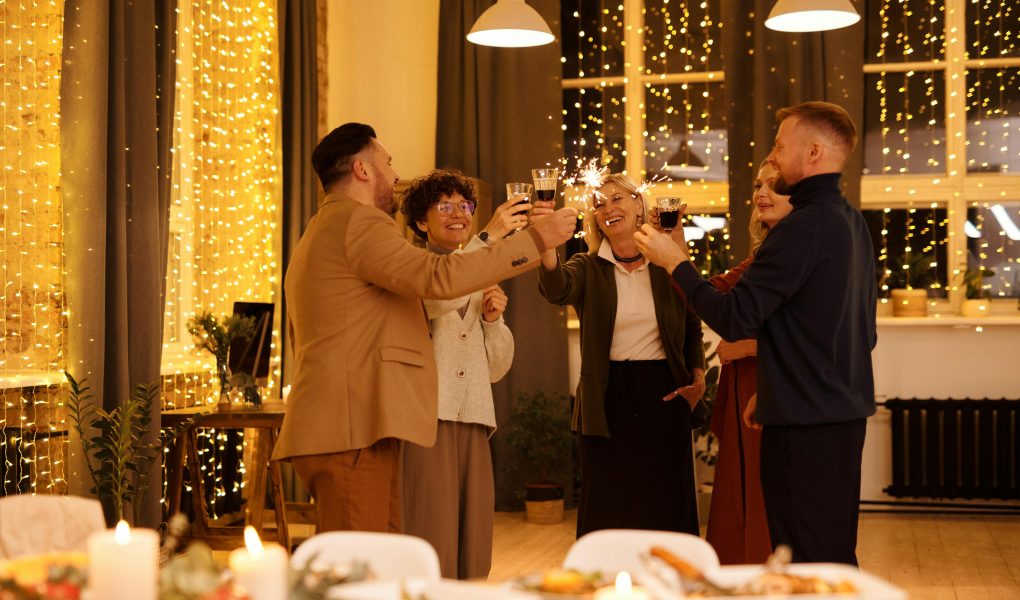Meeting your boyfriend’s parents for the first time can be a nerve-wracking experience, filled with the pressure to make a good impression. Imagine this: you’ve spent hours choosing the perfect outfit, rehearsed a few icebreakers, and now, as you step into their home, your heart is pounding. Sound familiar? You’re not alone. Nearly everyone in a relationship goes through this rite of passage, and it’s completely normal to feel anxious about it. But fear not! This article is here to help you navigate this crucial meeting with grace and confidence.
The first meeting with your boyfriend’s parents is a significant milestone in your relationship. It’s a chance to connect with the people who raised the person you care about and to start building a relationship with them too. It’s about showing respect, interest, and the genuine qualities that made your boyfriend fall for you in the first place.
In this article, we’ll explore practical tips and conversation starters to help you sail through this meeting smoothly. From preparing beforehand to making a great first impression, engaging in meaningful conversations, handling awkward moments, and ending the encounter on a positive note—we’ve got you covered. By the end, you’ll be equipped with the knowledge and confidence to impress your boyfriend’s parents and leave a lasting positive impression. So, take a deep breath, relax, and let’s dive into this together!
Preparing for the Meeting
Research and Homework
Before you meet your boyfriend’s parents, it’s a good idea to gather some basic information about them. Ask your boyfriend about their interests, professions, and any topics to avoid. This can help you find common ground and steer clear of any potential landmines. For instance, if they’re passionate about gardening, knowing a bit about plants can be a great conversation starter.
Example Questions to Ask Your Boyfriend:
– “What do your parents do for a living?”
– “Do they have any hobbies or interests?”
– “Are there any topics I should avoid?”
– “Does your mom have a favorite book or author?”
– “What’s your dad’s favorite type of music?”
– “Do they enjoy any particular TV shows or movies?”
– “Are there any foods they absolutely love or dislike?”
– “Have they traveled anywhere recently that they enjoyed?”
Having this information will arm you with conversation starters and help you steer clear of sensitive subjects. For example, if your boyfriend’s mom loves cooking, you could say, “I’ve heard you’re an amazing cook. What’s your favorite dish to make?”
Mindset and Attitude
Approach this meeting with the right mindset. Remember, it’s not an interview; it’s an opportunity to get to know the people who mean a lot to your boyfriend. Be yourself, and don’t try to put on a façade. Authenticity is key to making a genuine connection. Keep in mind that everyone, including his parents, understands that meeting new people can be a bit stressful.
Quotes to Boost Confidence:
– “Hi, I’m [Your Name]. I’m really excited to meet you both. [Boyfriend’s Name] has told me so much about you.”
– “It’s great to finally meet you. I’ve heard such wonderful things about you from [Boyfriend’s Name].”
– “Hi, I’m [Your Name]. I’ve been looking forward to meeting you both.”
– “Hello, I’m [Your Name]. It’s great to finally put faces to the names!”
– “Nice to meet you! I’m [Your Name]. I’ve heard a lot of wonderful things about you.”
– “Hi, I’m [Your Name]. Thanks for having me over.”
– “Hello, I’m [Your Name]. [Boyfriend’s Name] speaks so highly of you both.”
Dress and Presentation
Choosing the right outfit is important, but it doesn’t have to be a source of stress. Aim for something that is comfortable yet presentable. Avoid overly casual attire like ripped jeans or overly formal clothes that might make you feel out of place. A nice dress or a smart-casual ensemble is usually a safe bet. The goal is to look put-together without trying too hard.
Tips on Dressing:
– “Choose an outfit that makes you feel confident and comfortable.”
– “When in doubt, opt for classic and understated.”

First Impressions Matter
Greeting and Introduction
The initial greeting sets the tone for the entire meeting. A warm smile, a firm handshake, and a confident introduction go a long way. When you introduce yourself, mention how excited you are to meet them and that you’ve heard great things about them from your boyfriend.
Quotes for Introduction:
– “Hi, I’m [Your Name]. It’s so nice to finally meet you. [Boyfriend’s Name] has told me so much about you.”
– “Hello, I’m [Your Name]. I’m really looking forward to getting to know you both.”
Body Language
Positive body language is crucial when making a first impression. Maintain good eye contact, smile, and use open, friendly gestures. Avoid crossing your arms, which can make you seem closed off or defensive.
Tips for Positive Body Language:
– “Make sure to maintain eye contact and smile often.”
– “Keep your posture open and relaxed to appear approachable.”
Initial Small Talk
Small talk can be your best friend during the initial meeting. Safe, neutral topics like the weather, recent events, or shared interests are great icebreakers. This shows that you’re engaged and interested in having a conversation.
Small Talk Starters:
– “The weather has been lovely today. Do you enjoy spending time outdoors?”
– “I heard you enjoy hiking. Do you have any favorite trails around here?”
– “Have you always lived in this area?”
– “Do you have any favorite local restaurants?”
– “What do you enjoy doing in your free time?”
– “Have you been to any good events or festivals lately?”
– “Are there any activities you enjoy doing together as a family?”
Creating Engaging Conversations
Finding Common Ground
Finding common ground helps in building a connection. Look for shared interests or experiences and use them as a basis for conversation. If your boyfriend’s parents mention a hobby or interest, try to relate it to something you enjoy.
Quotes for Finding Common Ground:
– “I love traveling too! What’s your favorite destination?”
– “Gardening sounds wonderful. I’ve been trying to grow my own herbs at home.”
– “I’ve recently taken up painting. Have you ever tried it?”
– “I love animals. Do you have any pets?”
– “I enjoy cooking too! What’s your go-to recipe?”
– “I’m a big fan of outdoor activities. Do you like camping or fishing?”
– “I saw some beautiful plants in your garden. Do you enjoy gardening?”
Active Listening
Active listening is key to showing that you’re genuinely interested in what they have to say. Nod, smile, and ask follow-up questions to show that you’re engaged.
Tips for Active Listening:
– “That’s fascinating! Can you tell me more about it?”
– “It sounds like you had a great time. What was the highlight of your trip?”
– “That’s really interesting! How did you get into that hobby?”
-“Wow, that must have been an amazing experience. Can you tell me more about it?”
– “That sounds challenging. How did you manage it?”
– “I’d love to hear more about your trip to [destination]. What was your favorite part?”
– “That’s a great story. What happened next?”
Responding to Questions About Yourself
When asked about yourself, balance honesty with tact. Share your interests and experiences, but keep it light and positive. Avoid controversial or overly personal topics.
Example Responses:
– “I’m currently working as a [Your Job]. I really enjoy it because [Reason]. What about you? What do you enjoy most about your work?”
– “In my free time, I love reading and hiking. How about you? What are your hobbies?”
– “I’m passionate about volunteering. I spend a lot of time at the local animal shelter. How about you?”
– “I enjoy reading mystery novels. Do you have any book recommendations?”
– “In my free time, I love trying out new recipes. What’s your favorite cuisine?”
– “I recently started learning to play the guitar. Do you play any instruments?”
– “I’m really into fitness and enjoy running. Do you like any sports?”

Asking About Their Lives
Showing Genuine Interest
Showing genuine interest in their lives is a great way to build rapport. Ask questions about their experiences, interests, and family traditions. This shows that you care about getting to know them as individuals.
Quotes for Showing Interest:
– “How did you and [Boyfriend’s Name]’s mom/dad meet?”
– “Do you have any family traditions that you look forward to every year?”
– “How did you choose your career path?”
– “What’s a memorable family vacation you’ve taken?”
– “Do you have any advice for someone just starting out in their career?”
– “What’s a hobby you’ve always wanted to try but haven’t yet?”
– “What’s one of your favorite memories from [Boyfriend’s Name]’s childhood?”
Family Stories and Traditions
Asking about family stories and traditions can lead to interesting and engaging conversations. It also shows that you’re interested in understanding their family dynamics and values.
Questions About Traditions:
– “Does your family have any unique holiday traditions?”
– “What are some of your favorite family memories?”
– “Are there any special traditions your family has during holidays?”
– “What was [Boyfriend’s Name] like as a child?”
– “Do you have any favorite family recipes that have been passed down?”
– “What’s a funny family story that everyone loves to tell?”
– “How do you usually celebrate birthdays in your family?”
Work and Hobbies
Inquiring about their careers and hobbies can lead to lively discussions. It shows that you respect their experiences and are curious about what they enjoy.
Quotes for Inquiring About Work and Hobbies:
– “What do you enjoy most about your work?”
– “I heard you’re into gardening. What do you like to grow?”
– “What inspired you to get into your field of work?”
– “What’s a typical day like for you at work?”
– “Do you have any hidden talents or skills?”
– “What’s your favorite way to relax after a long day?”
– “Are you involved in any community activities or groups?”
Navigating Awkward Moments
Handling Silences
Awkward silences are inevitable, but they don’t have to be uncomfortable. Have a few topics in mind to fill the gaps, or ask open-ended questions to keep the conversation flowing.
Quotes for Handling Silences:
– “So, what do you enjoy doing on weekends?”
– “Have you seen any good movies or TV shows lately?”
– “So, do you have any plans for the weekend?”
– “What’s your favorite place to visit in this town?”
– “Are you reading any interesting books right now?”
– “I’d love to hear about any recent hobbies or projects you’ve been working on.”
– “Have you tried any new restaurants or recipes lately?”
Dealing with Tough Questions
Sometimes, you might face tough or uncomfortable questions. It’s important to stay calm and answer honestly but diplomatically. If a question catches you off guard, it’s okay to take a moment to think before responding.
Example Responses to Tough Questions:
– “What are your intentions with our son?” – “I care about [Boyfriend’s Name] deeply and my intention is to support and grow our relationship.”
– “Are you planning to get married?” – “We’re enjoying our time together and taking things one step at a time.”
– “How do you feel about [Boyfriend’s Name] and me moving in together?” – “We’re really excited about it and looking forward to this new chapter.”
– “What do your parents do?” – “They’re both retired now, but they were very dedicated to their careers in education and healthcare.”
– “Do you see yourself living here long-term?” – “I’m keeping my options open, but I really like the area so far.”
– “Are you planning to have children?” – “We’re not there yet, but we’ll definitely discuss it when the time is right.”
– “How do you manage work and personal life?” – “It’s a balancing act, but I try to prioritize and make time for both.”
Maintaining Composure
Staying calm under pressure is crucial. If the conversation veers into uncomfortable territory, try to steer it back to neutral ground. If all else fails, a polite deflection can work wonders.
Quotes for Maintaining Composure:
– “That’s an interesting perspective. What do you think about [New Topic]?”
– “I can see how you’d feel that way. Have you always lived in this area?”

Ending the Meeting on a Positive Note
Expressing Gratitude
As the meeting comes to a close, it’s important to express your gratitude. Thank them for their hospitality and the opportunity to meet them. This leaves a positive final impression.
Quotes for Expressing Gratitude:
– “Thank you so much for having me. I really enjoyed getting to know you both.”
– “I appreciate your hospitality. It was wonderful to spend time with you.”
– “Thank you for a lovely evening. It was a pleasure meeting you.”
– “I had a wonderful time. Thank you for your hospitality.”
– “I really appreciate you having me over. It was great to get to know you both.”
– “Thanks so much for the delicious meal. I enjoyed every moment.”
– “I’m so grateful for your warm welcome. I look forward to seeing you again.”
Future Plans
Mentioning future plans or expressing a desire to see them again shows that you’re interested in building a relationship with them. It also gives you something to look forward to in the future.
Quotes for Mentioning Future Plans:
– “I hope we can do this again soon. It was lovely meeting you.”
– “Maybe next time, we could all go out for dinner. I’d love to continue our conversation.”
– “I’d love to do this again sometime. Maybe we could plan a dinner out?”
– “I hope we can get together again soon. It was lovely meeting you.”
– “Let’s plan a barbecue or a picnic next time. I’d love to spend more time with you.”
– “Maybe we could all go see a movie or attend an event together in the near future.”
– “I’m looking forward to the next time we can all get together. Let’s stay in touch.”
Handling Potential Conflicts or Disagreements
Staying Calm and Composed
When conflicts or disagreements arise, the most important thing is to stay calm and composed. Reacting emotionally can escalate the situation, so take a deep breath and think before you speak.
Example Tip:
“If you feel yourself getting upset, take a moment to breathe deeply and gather your thoughts before responding.”
Finding Common Ground
In the heat of a disagreement, try to find common ground. Acknowledge their perspective and look for areas of agreement. This can help de-escalate tension and show that you’re open to understanding their viewpoint.
Example Quote:
– “I see where you’re coming from. I think we both agree that [common ground].”
Agreeing to Disagree
Sometimes, it’s best to agree to disagree. Not every disagreement needs to be resolved in the moment, and it’s okay to acknowledge that you have different viewpoints.
Example Quote:
– “I understand we have different perspectives on this. Let’s agree to disagree for now and focus on enjoying our time together.”
Redirecting the Conversation
If a topic becomes too heated, it can be helpful to gently steer the conversation to a different, more neutral topic. This can prevent the disagreement from overshadowing the entire meeting.
Example Quote:
– “I think we’ve had a good discussion on this. How about we switch
gears and talk about [new topic]?”
Seeking Understanding
Express a genuine interest in understanding their viewpoint. Ask questions to clarify their position and show that you’re willing to listen.
Example Quote:
– “I’m curious to understand your perspective better. Can you tell me more about why you feel that way?”

Follow-Up
Following up after the meeting with a thank-you note or a message is a nice touch. It reinforces your appreciation and leaves a lasting positive impression.
Tips for Follow-Up:
– “Sending a thank-you note or message shows that you value their time and hospitality.”
– “Mention something specific you enjoyed about the meeting to personalize your message.”
– “It was so nice meeting you both. I’ll make sure to send a thank-you note.”
– “I’ll send you the recipe for that dish we talked about. Thanks again for the lovely evening.”
– “I’ll reach out soon to plan our next get-together. Thanks for having me!”
– “I’m excited to see you again. I’ll follow up with some dates for our next visit.”
– “Thank you again for your hospitality. I’ll send a thank-you message later to express my gratitude.”
Conclusion
Meeting your boyfriend’s parents for the first time is a significant milestone that can set the tone for your future interactions. By preparing in advance, making a great first impression, engaging in meaningful conversations, and navigating any awkward moments with grace, you can create a positive experience for everyone involved.
Remember, the key is to be yourself and show genuine interest in getting to know them. The effort you put into this initial meeting will lay the foundation for a strong and respectful relationship with your boyfriend’s parents. So, take a deep breath, trust in your ability to connect with others, and embrace this opportunity to strengthen your bond with the people who matter most to your boyfriend.
As you embark on this journey, keep these tips and conversation starters in mind. They will help you navigate the meeting with confidence and ease. And who knows? You might even find yourself looking forward to future gatherings with your boyfriend’s family. Good luck, and enjoy the experience!



